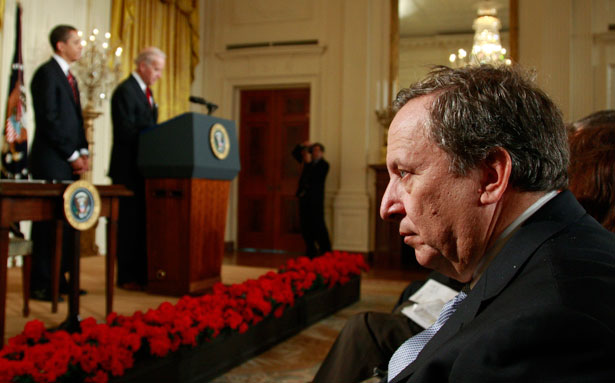
Larry Summers. (Reuters/Jason Reed)
The Sunday afternoon announcement that Larry Summers is giving up his quest to become Federal Reserve chairman resonates with meaning for reform—both for government and the Democratic party. After several decades of dominance by the center-right financial perspectives of New Democrats, this is a huge loss for the Rubin-Clinton wing. And it foretells more to come.
When the Obama White House let it be known in early summer the president expected to appoint Summers as successor to Fed chairman Ben Bernanke, the party erupted in rage and rebellion. It amounted to rewarding the very policy architects who led the country into ruin with their financial deregulation and Wall Street–friendly non-enforcement and bailouts for the too big to fail bankers. Instead of going along meekly, progressive Dems built a firestorm against Summers and kept throwing on new logs.
The White House leakers kept reassuring favored reporters that the deal was done, the president really wants Larry in this pivotal position determining policy on money and credit for the country. Leading reform senators—Sherrod Brown, Elizabeth Warren and Jeff Merkley—fired back and raised the ante. If Summers is nominated, these key members of the Senate banking committee intend to vote against his confirmation. That could well be fatal to Summers’s and Obama’s ambitions. To make it worse, Senator John Tester of Montana, a moderate by any measure, let it be known he would join them in voting to block Summers. Among other disabilities, Summers was contemptuous of policy opponents and known for refusing to acknowlege collosal errors—the very opposite of a consensus leader.
Finally, the White House mercifully pulled the plug on flawed Larry. (It seems very unlikely Summers got the message on his own, considering his record for stubborn egotism.)
This is a huge victory for the prospects for genuine economic reform—well beyond anything Obama has so far proposed or accepted. The president might fumble around for a similarly conservative appointment, but he has a chance to change the outlook dramatically by appointing a new Fed chair who understands the deep dislocations created in part by Federal Reserve policy during the last three decades, from Volcker to Greenspan to Bernanke, under Democrats as well as Republicans.
Obama can start the healing by naming Janet Yellen, the moderately liberal vice chair of the Federal Reserve, who well understands that much deeper change must be considered to get the US economy back in balance again. It will not come quickly, but this can be the political watershed—the moment when this Democratic president chose to focus on the future rather than clinging to the failed past.
In other words, Obama can create a quite different legacy for himself by restarting his economic policy and encouraging serious reform at the central bank and in traditonal policies. The president of course cannot complete this new agenda in his remaining years, but he can launch the action and teach public opinion what the task of economic reconstruction should involve. That is, he can begin the “new politics” many of us had hoped he would bring to Washington.
In the next few months, as it happens, President Obama will appoint four and as many as five new governors for the seven-member Federal Reserve Board. That is an unprecedented opportunity to influence the future if he chooses wisely and reaches beyond the usual list of safe choices with conventional views. The best part is this power is unilateral. This is one instance where Barack Obama doesn’t have to make nice with know-nothing Republicans or seek permission from Wall Street titans. He can do this on his own.
But the defeat of Larry Suummers tells the White House and this president they had better start listening to the restless reformers on the left of the party. Senators and progressive Democrats in the House have serious ideas for reform. Having won this pivotal victory, they are sure to push for larger goals. Instead of running away from the liberal-labor progressives, Obama’s presidency should put an arm around them.
![]() Take Action: Tell President Obama to Break Up the Old Boys’ Club and Appoint Janet Yellen
Take Action: Tell President Obama to Break Up the Old Boys’ Club and Appoint Janet Yellen
John Nichols rejoices in the populist rebellion that brought down Larry Summers.


